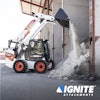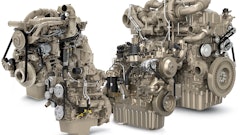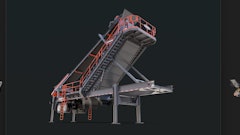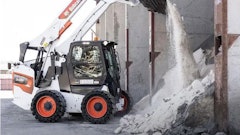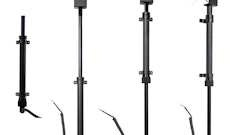
COVID-19 rapidly accelerated changes in the construction industry in terms of digitalization. Doug Hundt, president, Industrial, Vermeer, cited one estimate that the industry went through roughly 10 years’ worth of change in a period of just 18 months.
“I think all have had customers order parts online, seek information in a different way digitally, salespeople communicating virtually with customers,” he said while participating in an OEM panel at the annual AED Summit in Las Vegas earlier this year. “I don’t think those habits are going to change... because it is about efficiency and productivity.”
Rather, Hundt expects this rate of change to continue as customers recognize the type of efficiency they can gain and information they can obtain. This could have a profound effect on the customer/dealer relationship.
“It’s still a relationship business,” he stated. “At the end of the day, it is still a people business.” Yet, there are risks as new and highly savvy online suppliers like Amazon, eBay and Alibaba gain prominence in the industrial market space.
“The digital enabling through COVID [allowed customers] to be educated without the salesperson. It allowed them to buy parts wherever they want,” Hundt noted. “Frankly, if your dealership isn’t equipped for that, you are subject to either aftermarket, Amazon, whomever, because [the customer] is going to get the service they want as quick as they want.”
To compete with these newcomers, adaptation to evolving customer needs is critical. “If you’re not adopting technologies that your customers expect and adapting to the trends, you’re probably not going to be [around] very long, whether that’s an OEM or a dealer,” cautioned Jason Daly, global director, Marketing & Support, John Deere Construction.
While some dealers have been resistant to change, most are, fortunately, listening to customers. “Because if you’re not listening to your customers, you’re simply going to render yourself irrelevant,” said Daly. “That customer is the voice of change for all of us to think differently and provide different solutions to meet their needs.”
Online Giants Prove Tough Competition
According to Luke Powers, founder and CEO, Gearflow, in the presentation "Amazon Business is Coming for the Construction Industry: What You Need to Know", online marketplace giant Amazon was drawn to the construction environment by high-margin opportunities such as parts sales. Amazon Business is now applying the company’s proven consumer model to deliver a similar user experience to customers in the industrial space.
“A lot of your [customers] are going to be drawn into buying more online,” Powers predicted. “Their machines are down. It's expensive for them. They want something easy.” Throw in the prospect of an array of cost-effective (meaning, cheaper) choices and Amazon Business presents a compelling case. “Contractors need to find ways to add to their bottom line. Costs are increasing ‘2x’ since the year 2000, which is pushing down on the margins, which are 5.5% as an industry average in 2019.”
Yet, while price is important, Powers sees delivery time as perhaps the larger attraction. “The speed of Amazon Prime and next-day shipping is probably a bigger threat... than the pricing, even though most [contractors] are very price sensitive,” said Powers.
 To remain competitive, equipment dealers must show a greater understanding of the customer and their needs than the online giant is likely to pursue.ACBM staff
To remain competitive, equipment dealers must show a greater understanding of the customer and their needs than the online giant is likely to pursue.ACBM staff
Powers views an aggregated industry platform, not unlike his company Gearflow, as an essential means to combat suppliers such as Amazon Business. “I think if we had an aggregated, best selection of only quality suppliers – that would give contractors the availability and, theoretically, the speed, warranty and finally price they need,” he asserted.
Such a platform would allow for seamless transactions with the top suppliers in the industry, all on the same site. To Powers, “that’s much more compelling than going to Amazon.”
Transition From Sales to Solutions
“The reason that Amazon works is because it’s easy. That’s why people go there,” stated Tim Tripas, senior vice president, CE Division, Komatsu America Corp., during the OEM panel discussion. But while making transactions easier is important, it’s not the only means to retain customers.
“If our salespeople, our PSSRs, truly become solution providers, they’ll get that first phone call,” said Tripas. “And that’s what we have to focus on.”
Certain products such as parts, attachments and perhaps even some machines will continue to be sold online, acknowledged Stephen Roy, president, Volvo Construction Equipment North America and chairman for the company’s South American operations. “But the more complex [products], as you start integrating systems and data, that’s where the dealers to me are going to have the opportunity for additional revenue streams,” he said.
Equipment dealers know both their customers and products in ways Amazon and similar competitors can’t. “Product is important but it’s about the total offer that the customer has,” said Roy. “It’s going to be more about how you surround that product with services that make it efficient. It’s not just the machine. It’s not just the fleet. It’s the site. Those are things that all of us are going to have to be more involved in.”
This includes assuming a proactive rather than reactive role in equipment uptime. “It’s not about waiting for something to repair and ‘let’s make as much money as we can.’ It’s going to be about how do you keep that machine up and running and be predictive,” Roy explained. “It’s a different mindset, but other industries have gone through the same concept, so it can be done.”
John Deere’s Daly agreed, noting, “We’re on a journey… with our dealers to really move them into the specialization world – to help them to become consultancies to customers. When you can become that consultant to a customer, you enable other means to margin improvement for your business.
 Product is important but it’s about the total offer to the customer. This includes assuming a proactive rather than reactive role in equipment uptime.ACBM staff
Product is important but it’s about the total offer to the customer. This includes assuming a proactive rather than reactive role in equipment uptime.ACBM staff
Even those who do use Amazon Business as a parts resource will come back for that added value –whether it’s helping to interpret telematics data or identifying the best machine for an application or conditions. “Ultimately, you can find solutions over time to keep them with you, and obviously digitize your business to enable customers to buy the way they want to buy,” Daly stated. “Give them what they need, and they’ll find a means to come back to you in future.”
Vermeer’s Hundt sees the industry quickly moving from a “sales game” to that of providing customer solutions. “It’s about providing an application expertise to those customers – knowing their industry better than they know it,” he said. “If we provide that expertise, that’s a relationship that Amazon won’t take away from us.
“But more importantly, our dealers are showing the customer how to make more money, how to be more profitable,” he continued. “They’re short of labor; they’re short of technicians. So, they’re leaning on dealers to provide that expertise so they can be up and managing the job pressures that they have.”
The more a dealer’s business becomes about local expertise and value-added services customers need and depend on, the easier it will be to fight the online giants.
“You’re providing uptime, providing service, providing knowledge,” said Hundt, “and those are things that Amazon probably will never be able to bring.”



